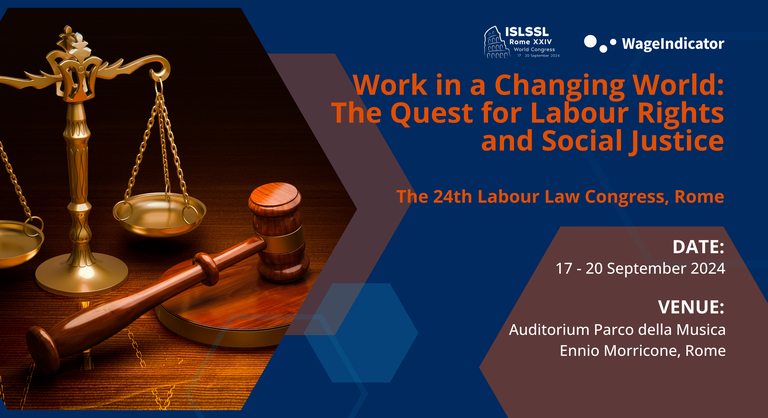About the Event
Between the 17th and 20th of September 2024, Mercatorum University and the International Society for Labour and Security Law are hosting the 24th Labour Law Congress in Rome. The WageIndicator Foundation will be hosting several sessions at the conference. Initial details of the same are below, further information will be added soon:
Parallel Sessions (Block A) | Wednesday, 18th September | 13:45 - 14:45
Towards Fair Compensation: Exploring Decent Wage Models within the Framework of EU Directives, SDGs, and UN Guiding Principles
This panel will explore the key differences between minimum wages, living wages, and adequate wages, and how these concepts intersect with EU Directives, SDGs, and UN Guiding principles. Moreover, it will address questions around how policymakers and organizations can strike a balance between ensuring fair wages for workers while considering economic sustainability.
Presentations/Presenters:
- Moderator: Fiona Dragstra (General Director, WageIndicator Foundation)
- Rational of Minimum Wage Setting and Understanding the Variety in Minimum Wage Rates in 207 Countries from 2014-2023: Nii Ashia Amanquarnor (Data Analyst, WageIndicator Foundation) - Access the presentation here
- How Can Organisations Effectively Utilize Smart Reporting Tools to Enhance Transparancy and Accountability in Wage Practices?: Fiona Dragstra (General Director, WageIndicator Foundation) and Paulien Osse (Lead of Global Living Wage Team, WageIndicator Foundation)
- The Role of Minimum Wages, Living Wages and Adequate Wages Throughout the World in Navigating EU Directives: Daniela Ceccon (Director of Data, WageIndicator Foundation) - Access the presentation here
- Living Wages and Reducing Material Deprivation Globally: Nii Ashia Amanquarnor (Data Analyst, WageIndicator Foundation) and Nina Holickova (Research Analyst, Central European Labour Studies Institute) - Access the presentation here
Book and Journals Presentation | Wednesday, 18th September | 15:00 - 17:45
Is there really a race to the bottom? Exploring trends through the Labour Rights Index
This presentation introduces the Labour Rights Index (LRI), comparing labour legislation in 145 countries. Given that labour law comparisons are rare or restricted only to employment protection legislation, working condition legislation or trade union rights legislation, the LRI is the first comprehensive de-jure Index. It follows an employment life cycle approach and evaluates countries along ten indicators - fair wages, decent work hours, employment security, family responsibilities, maternity at work, safe work, social security, fair treatment, child and forced labour, and trade unions. The ten indicators and 46 sub-indicators are rooted in the ILO’s Decent Work Agenda.
Given that the WEF’s Global Risks Report 2023 identifies employment crises as an important risk in the short and long-term risk, comparing labour legislation globally and identifying best regulatory practices is crucial. Moreover, the Index provides a comprehensive perspective of de-jure working norms, making it a useful benchmarking tool in policy debates at the national and international levels.
You can access the full presentation here.
Presenter:
- Iftikhar Ahmed (Labour Law Specialist, WageIndicator Foundation & Founder, Centre for Labour Research)
Parallel Sessions (Block G) | Friday, 20th September | 14:00 - 15:30
Collective Bargaining Practices on AI and Algorithmic Management in European Services Sectors
As part of this session, our team shall present research examines the evolving landscape of collective bargaining practices in the face of advancing Artificial Intelligence (AI) and Algorithmic Management (AM) within the European services sector. It looks at how collective bargaining agreements (CBAs) are adapting to include AI-related clauses, reflecting an emerging paradigm in labor relations. Incorporating insights from a diverse array of 148 trade union representatives across 32 countries, the research assesses the prevalence and impact of AI in collective bargaining. The findings are rooted in a methodical analysis of 31 CBAs - annotated in the WageIndicator Collective Agreements Database - that are pioneering in their inclusion of AI-related provisions.
Presenters:
- Brunnerová Simona (Junior Research, Central European Labour Studies Institute)
- Daniela Ceccon (Director of Data, WageIndicator Foundation)
- Barbora Holubova (Senior Researcher, Central European Labour Studies Institute)
- Marta Kahancová (Managing Director, Central European Labour Studies Institute & Director of Research, WageIndicator Foundation)
- Gabriele Medas (Collective Agreement Database Manager, WageIndicator Foundation)
Parallel Sessions (Block H) | Friday, 20th September | 15:45 - 16:45
Fairness in Flux: Navigating the Gig Economy through Regulatory Innovation and Collective Bargaining
It has become clear that besides considerable perks such as flexibility and access to (online) work for qualified workers, the gig economy comes with an increased risk of precarity for workers. This session aims to shed light on the critical issues related to gig workers’ rights and needs, specifically focusing on regulatory frameworks, collective bargaining, and transparency in costs and earnings. It will explore effective ways to regulate a rapidly developing sector and examine the possible role of collective bargaining in ensuring fair and sustainable conditions for gig workers. The presentations will range from a general overview of the regulatory landscape, understanding the best practices across the world and discussing a concrete tool developed for the needs of gig workers. Access the full presentation here.
Presentations/Presenters
- Moderator: Martijn Arets (Gig Economy Researcher, WageIndictor Foundation)
- The Current State of Events in Global Regulations of the Platform Economy: Iftikhar Ahmed (Labour Law Specialist, WageIndicator Foundation & Founder, Center for Labour Research)
- Understanding the Challenges and Solutions to Find the Gig Economy's Silver Bullet - Is there one?: Martijn Arets (Gig Economy Researcher, WageIndicator Foundation)
- Living Tariff as a Tool for a Living Tariff for Gig Workers: Daniela Ceccon (Director of Data, WageIndicator Foundation) and Paulien Osse (Lead of Global Living Wage Team, WageIndicator Foundation)
- Living Tariff for Gig Workers - Lessons Learned from Indonesia, Pakistan, Kenya and India: Nadia Pralitasari (Labour Law Specialist, WageIndicator Foundation and Gajimu Indonesia)

